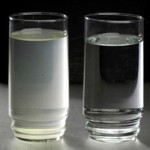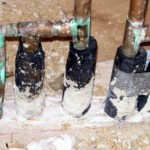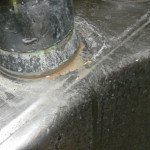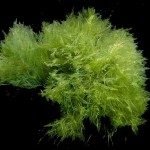Water Diagnosis
There are many common water concerns that can be identified simply by smelling, feeling, tasting and looking at your water. However, there are many problems that cannot be identified as easily. We are qualified to test your water and recommend the right solution for you, whether it is hard water treatment or a remedy for other water issues.

Hydrogen Sulfide: Smells like rotten egg
The presence of Hydrogen Sulfide is caused by decaying vegetation and oil deposits beneath the earth’s surface. Water containing Hydrogen Sulfide can alter the look and taste of beverages and cooked foods. The water can also corrode plumbing metals, such as iron, steel, copper and brass, as well as exposed metals in washing machines and other water-using appliances. Exposure to water containing Hydrogen Sulfide can darken silverware and discolor copper and brass fixture.

Chlorine: Tastes and smells like a swimming pool
Chlorine is commonly known to maintain swimming pools. It is also used in common household disinfectant products such as bleach. Often, municipalities use chlorine in the disinfection of the public water supply to manage bacteria levels in drinking water and to kill other potentially harmful agents. Chlorine, even at acceptable household levels, can contribute to dry eyes, skin irritation and can exacerbate conditions such as eczema.

Cloudy/Milky Water: Looks foggy
Turbidity is simply dirt or other suspended solids in your water, which gives it a cloudy, milky, foggy appearance. It is caused by sand and dirt getting into wells, or by run-off of matter into the water supply. It makes the water look unpleasant, but it can clog the small water-bearing openings in your faucets and it can cause wear on valves, seats and washers.

Iron water and Manganese: Tastes metallic
Iron water is caused by water passing through iron-bearing rocks. Because iron accounts for 5% of the earth’s crust, it can be found in just about all types of water supplies. Iron water can stain sinks and laundry, and it can form scale on pipes and water-using appliances. An iron water filter system is needed to address this issue

Acid Water: Creates blue-green stains
When water passes through hard rock such as granite or marble, acid water can result. By its nature, water wants to dissolve materials. When it comes into contact with materials it cannot dissolve, such as very hard rock, it comes into your home “hungry” and ready to eat away at everything it touches. Acid water cannot be detected by appearance, odor or feel. It can, however, cause blue-green stains on plumbing fixtures, and it can eat away chrome faucets, fittings and pipes.

Hard Water: Creates scum and buildup on fixtures
Hard water occurs when water passes through rock and picks up the calcium and magnesium. Hard water is easy to spot: it is the scum that collects on shower walls, leaves a bathtub ring, dulls your laundry, leads to lackluster hair and clogs your pores. It makes household cleaning difficult. Hard water deposits also clog pipes, cause water heaters to work inefficiently, shortening the life of water-using appliances

Algae, Mold and Bacteria: Smells like algae or mold
Different types of organic matter can make your water taste earthy or fishy. A common symptom of bacteria in your water is slime build-up in the toilet tank. Bacteria in water can take on many forms; have your water tested by a water treatment professional to learn what is in your water.

Nitrates: Undetectable smell or taste
Nitrate is a naturally occurring form of nitrogen, essential for plant growth and often added to soil to improve productivity. After a rainfall or irrigation, water moves through the soil and carries dissolved nitrates with it, into the ground water. For homeowners using wells or springs, water should be tested for nitrates by a water treatment professional, as it is potentially harmful to the health of both humans and animals.
Whether you’ve noticed one or several of these concerns, or whether you haven’t noticed a problem but you want to find out for sure, we at EcoWater Systems Las Vegas can perform an easy and comprehensive in-home water analysis and access to professional water labs.
